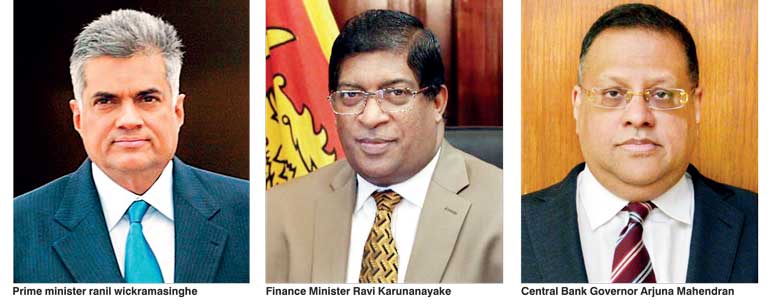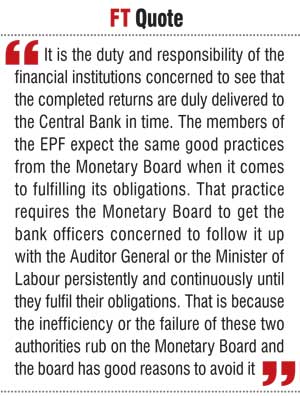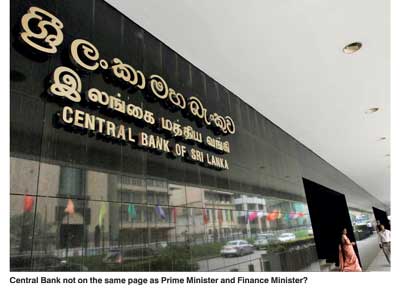Wednesday Feb 25, 2026
Wednesday Feb 25, 2026
Monday, 8 February 2016 00:10 - - {{hitsCtrl.values.hits}}

Selective response by EPF to concerns raised
The Central Bank has issued a clarification, carried by Daily FT in its print edition of 1 February 2016, on the Monetary Board’s alleged failure to publish the annual reports of the EPF after 2012, a concern raised by this writer in a previous article in this series.
This alleged failure has been only one of the concerns raised in the article under reference among many failures of the Monetary Board in the recent past as the trustee of EPF (available at: http://www.ft.lk/article/520800/EPF-and-ETF--Should-or-shouldn-t-they-be-merged-into-a-separate-institution?). Thus, the bank has been very selective in making its clarification and defensive in its tone. Yet, it could be considered a good sign since it displays the bank’s willingness to engage itself in an exchange with the public concerning its role in EPF.
The Monetary Board as trustee of EPF is ultimately accountable
The Monetary Board is the trustee of EPF and in terms of the Monetary Law Act, or MLA, it is the Monetary Board which has been incorporated and not the Central Bank. Hence, the Monetary Board is responsible for both the good and the bad outcomes of the actions of the institution known as the Central Bank.
The Governor, who is the Chairman of the Monetary Board, functions as CEO of the Central Bank and performs his duties on a delegated authority basis. Hence, it is the Monetary Board which is the master and not the Governor or any other officer of the Central Bank. Ultimately, the Board has to be accountable for everything which the Central Bank or its officers do, requiring it to be extra vigilant and cautious.
Central Bank’s ‘fault-finding’ with others
In this context, it is not clear whether the clarification in question had received the Monetary Board’s sanction, though it had defended the board’s failure to publish EPF annual reports after 2012. The clarification, while indirectly admitting that the Monetary Board had not published annual reports of EPF after 2012, had made three points in defence of the board.
In the first point, it has taken cover behind a legal provision relating to disclosures which the Monetary Board is required to make in terms of the EPF Act. 
In the second and third points, it found two other blameworthy scapegoats for its failure. One is the Minister of Labour and the other is the Auditor General. Thus, the bank, presumably on behalf of the Monetary Board, had ‘categorically’ stated that there had not been any delay on the part of the board in the submission of annual reports for audit by the EPF.
Then, it has indicated, this time not categorically of course, a further hurdle which it has to pass before it could release the annual reports of EPF to the public domain. That hurdle is the requirement to table them in Parliament and it is the responsibility of the Minister of Labour and not of the Monetary Board to pass that hurdle.
Seeking protection under a veiled legal cover in a full-disclosure era
The legal cover which the bank has taken implies that it has no responsibility for issuing an annual report. Its legal mandate, in terms of the EPF Act, has been to prepare four types of statements on the general account of EPF.
These four statements relate to the income and expenditure, assets and liabilities, receipts and payments and investments showing the face value, purchase price and market value of each type of investment.
In this connection, the reports relating to 2013 and 2014 are in different stages of the process involved. The annual report for 2013 has been audited by the Auditor General and submitted to the Minister of Labour for tabling in Parliament. If it has not been tabled in Parliament so far then the bank’s clarification implies that it is the Minister of Labour who has to be blamed and not the Monetary Board. The accounts relating to 2014 have been submitted to the Auditor General for audit and he has not submitted the audited accounts so far even though nearly one year has now elapsed. There, the implication is that the Auditor General is to be blamed for the failure.
Thus, the clarification issued by the country’s banking regulator testifies to a ‘responsibility-passing’ and ‘blame-assigning’ exercise.
Monetary Board should be extra-alert because it has been trusted by others
The EPF Act was enacted in 1958 by taking into account the regulatory, disclosure and investment structure that prevailed in the country at that time. The Monetary Board of the Central Bank was a supreme institution at that time and therefore, the drafters of the act did not think it necessary to establish a supervisor above the Monetary Board. Hence, the normal accountability procedure applicable to a government institution was made applicable to the EPF as well.
Accordingly, the Monetary Board was required to decide on the interest rate payable to members annually in consultation with the Minister of Labour and the Minister of Finance. The financial statements in a summary form were to be submitted to the Minister of Labour. The Parliamentary control over the EPF was exercised through the Committee on Public Accounts or COPA. The Auditor General was to audit the annual accounts of the fund and the performance of the Labour Commissioner.
Thus, the Monetary Board has been given extraordinary powers with respect to investments in EPF. As it transpired in the  Parliamentary debates on the draft EPF Bill in 1958, the government did not have any other public body except the Monetary Board of the Central Bank with which it could place the savings of the working people of the country with confidence. Due to this reason, the Monetary Board has to be extra alert about its functions relating to the EPF.
Parliamentary debates on the draft EPF Bill in 1958, the government did not have any other public body except the Monetary Board of the Central Bank with which it could place the savings of the working people of the country with confidence. Due to this reason, the Monetary Board has to be extra alert about its functions relating to the EPF.
Disclosure requirements today are wider and much improved
It is true that the Monetary Board has to disclose only four financial statements on the EPF to the Minister in terms of the act. But, the disclosure requirements today are much wider and improved.
It is specifically more important in the current context where the government is committed to introducing good governance, full disclosure and even the right of the people to information. Hence, the statutory requirements are only the minimum and not the maximum which the board has to disclose to EPF members today.
In this connection, the board has already set a precedent by issuing detailed annual reports for EPF in respect of 2011 and 2012, amid continuous demands made by opposition Parliamentarians at that time. As such, the board cannot go back to the 1950s now. That is because it has created reasonable expectations among the people who are concerned about the EPF that sufficiently detailed information would be disclosed to the public in the form of an annual report. It is this obligation of the Monetary Board which has not been fulfilled since 2012.
Feeling complacent once reports are submitted to AG or minister
It appears that the Central Bank is of the view that its job in relation to disclosing information on the EPF ends when it submits the final accounts to Auditor General for auditing or to the Minister of Labour to be tabled in Parliament. This should not be the case. The Monetary Board is the regulator of financial institutions and, therefore, it is the setter of good governance practices among financial institutions. It does not tolerate the excuse furnished by a financial institution that it has simply handed a completed return pertaining to its operations to the Postal Department to be sent to the Central Bank.
It is the duty and responsibility of the financial institutions concerned to see that the completed returns are duly delivered to the Central Bank in time.
The members of the EPF expect the same good practices from the Monetary Board when it comes to fulfilling its obligations. That practice requires the Monetary Board to get the bank officers concerned to follow it up with the Auditor General or the Minister of Labour persistently and continuously until they fulfil their obligations. That is because the inefficiency or the failure of these two authorities rub on the Monetary Board and the board has good reasons to avoid it.
Prime Minister expressed dissatisfaction about past behaviour of Monetary Board
The Prime Minister has announced in the Economic Policy Statement presented to Parliament in November 2015 that the government would take the EPF away from the Monetary Board, amalgamate it with the ETF and set up a separate statutory board.
This is what the Economic Policy Statement announced in this regard: “We will take measures to secure the funds in the EPF and ETF. Both these funds will be amalgamated to create a new national pension fund that will have a combined worth of Rs. 1.7 trillion. We will not leave room for politicians and officials to waste resources of this new pension fund as they did with the EPF/ETF funds. The Constitutional Council will appoint the board of trustees for the pension fund and a committee consisting of members of civil society, unions and chambers of commerce will supervise it.” This policy of the government was reiterated by the Minister of Finance too in Budget 2016.
The proposal made by the Prime Minister entails a substantial improvement to the prevailing governance structure of both the EPF and ETF. He has suggested a new control element in the form of public supervision of the trustees of the new pension fund to be established which neither the Monetary Board nor the ETF Board is subjected to at present.
Market feels PM’s concerns are valid
The Prime Minister’s statement is a serious indictment against the Monetary Board which had been appointed by legislators in 1950s as the trustee of the moneys belonging to the working people of the country. It expresses the view that the government is not happy about the past performance of the Monetary Board.
If the Monetary Board had done a good job there is no reason for the government to suggest that the EPF should be taken away from the Central Bank and handed to a new national pension fund.
The Prime Minister has given a hint about this dissatisfaction: He has said that the government will ‘secure the funds in EPF’ and through the new legislation would not allow ‘politicians and officials’ to waste resources of the new pension fund.
Some of the past investments made by the EPF and the practices of its management in the present as circulated in the market testify to this concern expressed by the Prime Minister.
Trustee obligation: If you don’t waste your money, don’t waste others’ money
The economic obligation of a trustee is that ‘he should handle the moneys belonging to the beneficiaries with the same care and caution with which he handles his own money’. This applies to the Monetary Board too as the trustee of the EPF.
This means that if a trustee does not waste his own money or put his money into extremely risky business, he should not waste or risk the money that has been placed under his care for the benefit of others.
The following are some examples, available in the public domain today that the Monetary Board has acted in breach of this trustee obligation.
Investing in banking shares and allowing politicians to appoint directors
The Monetary Board has invested EPF moneys in shares of commercial banks and finance companies that are being supervised and regulated by the board. Examples, as reported in the EPF Annual Report 2012, are HNB, Commercial Bank, DFCC Bank, Sampath Bank, Seylan Bank, Central Finance, The Finance, Vallibel One and People’s Leasing Company.
This has been done by the Monetary Board breaching a previous decision of the board not to do so in view of the obvious insider trading prospects and allegations that arise from such investments.
Through these investments, the Monetary Board has permitted politicians to appoint their own supporters to boards of these financial institutions and control their affairs. The problem faced by the Monetary Board in this connection is that, when it comes to assessing the suitability and propriety of these directors, the board did not have full freedom to do so objectively and impartially.
This writer took up this case and requested the Monetary Board to quit these financial institutions as quickly as possible in a previous article in this series (available at: http://www.ft.lk/article/387913/EPF-should-exit-banking-sector-and-Central-Bank-should-leave-private-banks-in-private-hands). Since these investments are still held by the EPF, the current Monetary Board appears to be enjoying the bad practice more than ever.
Investing in bankrupt companies
The Monetary Board has invested EPF funds in several bankrupt or low performing companies. Examples are PC House, Eden Hotels, Hyatt Regency and Sri Lankan Airlines. In the financial institution sector, it has also invested in the Finance Company with full knowledge that it was a bankrupt company. In the case of Hyatt Regency, the Monetary Board has invested Rs. 5 billion which money has not delivered any return to EPF members so far. With a massive fraud in the Hyatt Regency as revealed in a forensic audit conducted in mid 2015, it is likely that the case will be referred to law enforcement authorities and the Monetary Board too would be made answerable in a litigation (available at: http://www.dailymirror.lk/78149/hyatt-heist). Clearly, the Monetary Board has burned its fingers and dented its reputation with these investments.
Buying above and selling below the prevailing market prices?
The reports circulating in the market today about the investments of the EPF are also not very salutary to the Monetary Board (See reports at http://www.sundaytimes.lk/160131/business-times/epf-back-to-old-games-180942.html; http://www.economynext.com/Sri_Lanka_overnight_markets_recover_from_moral_suasion-3-4032-3.html).
The unconfirmed reports in the market say that the EPF buys bonds below the prevailing yield curve and sells them above the yield curve. In other words, it buys bonds above the prevailing market prices and sells them below the prevailing market prices. The result of this action is that those in the market who trade in the yield curve make money out of EPF’s trades.
Perhaps this market news may not be true. But it is in the interest of the Monetary Board to institute a full inquiry by engaging an independent investment auditor to look into these allegations to protect its name.

Unwitting refutation of PM and FM by the Central Bank?
The clarification issued by the Central Bank has defended and given a good certificate to the Monetary Board with respect to its role in the EPF. That is understandable because it is the Monetary Board which owns the Central Bank.
But the Prime Minister, endorsed by the Minister of Finance as well, had claimed that the government was not happy about the performance of the board with respect to the safety of the funds in the EPF. They wanted to take the fund away from the Monetary Board. In that context, has the clarification unwittingly refuted the Prime Minister and the Minister of Finance?
(W.A. Wijewardena, a former Deputy Governor of the Central Bank of Sri Lanka, could be reached at [email protected])